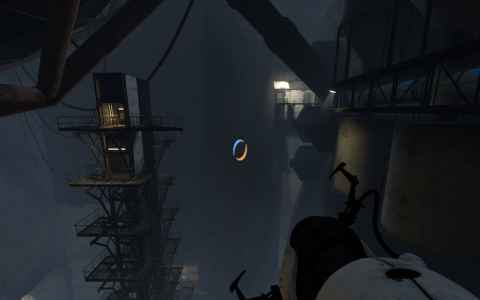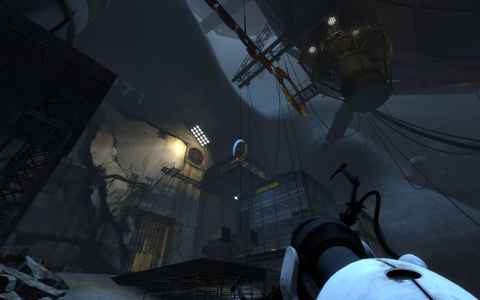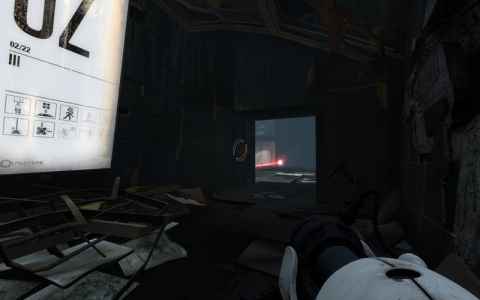Portal 2
In 2007, Valve released The Orange Box, a compilation of three games: Half-Life 2: Episode 2, Team Fortress 2 and Portal. The two former were well established franchises, but it would be the latter that would end up winning all the awards. Portal was everything that contemporary games weren't: It was polished, short and to the point. It didn't stretch gameplay over several hours just because and thanks to that remained fresh and engaging throughout its two-hour span. It was a realization of the philosophy that perfection is achieved, not when there is nothing more to add, but when there is nothing left to take away
. In creating Portal the team had the courage to cut things gameplay-wise, and to leave things unsaid and unexplained story-wise. In short, Portal knew when to stop. I was impressed enough to write a letter to Gabe Newell just to say how much I appreciated the game. In contrast to Portal's polished little gem, Half-Life 2: Episode 2 was the classic blockbuster, designed to impress with size and amount instead of with elegance. Where Portal did much with little, HL2:Ep2 did little with much, and while it received good reviews it failed to have the same impact as Portal.
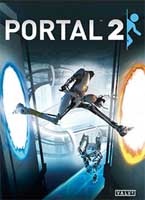
Valve Software, 2011
PC
A blockbuster that just doesn't know when to stop and leaves you saying "thanks, that's quite enough". (3/5)
The reason I'm covering this background is because the biggest differences - good and bad - between Portal and Portal 2 can be summed up in one word: "size". While Portal was done by a team of eight, Portal 2 has no fewer than forty people behind it. I haven't managed to find the number of lines of dialog in Portal, but Portal 2 contains over 13,000 lines of dialog.[1] Portal could be completed in two hours, Portal 2 takes at least six hours. What has all this size brought us, then? Sadly, even after thoroughly ransacking my feelings to remove any anti-sequel bias, I have to conclude that it has made Portal 2 to be more like Half-Life 2: Episode 2 than Portal. Although it is in no way a bad game, unlike Portal, Portal 2 doesn't know when to stop.
Visuals and Sound
As can be expected from a Valve game, the art is top-notch. The Aperture Science facility has changed from a set of static sterile rooms to what can best be described as a living organism. While it was only hinted in Portal that the test chambers are reconfigurable, we now get to see the arms that hold up the wall tiles, and in some sequences, we even get to see rooms being configured for testing. In the mid third of the game we are treated to huge vistas and a trip through the history of Aperture Science, complete with nods to Bioshock. The art is where Portal 2 shines. The sheer amount of it is breathtaking. The quality is impeccable. It is evident that this game has utterly consumed the output of forty very talented people. As I'll get to in a moment, one can question just what this creative output has been for, but it is undoubtedly there.
Writing
When describing where Portal 2 went wrong it is natural to start with the writing, and the humor in particular. Portal was known for its witty writing, and much of the impact of the game was delivered by the words of Erik Wolpaw and Chet Faliszek. Sadly, the humor has taken a dive in Portal 2. It is crude where Portal was elegant and repetitive where Portal seemed to always serve up something new. The satire on contemporary corporate-speak that is the base of the comedy in Portal 2 can't carry the six to eight hours of gameplay it is asked to. The lines end up being variations on the same theme, with one joke being recycled no less than three times with slight changes in wording. By the time we reach the end of the game the humor has thoroughly worn out its welcome, and if you ever try to replay the game you will find it to be pure torture - especially the long-winded jokes that you can't skip. It's as if the player only exist so that the game has someone to tell jokes to.
The story can be dispensed with quickly - there is really none. While there is a story in most basic sense, it is largely made up on the spot, utterly unbelievable, retconned into oblivion and serves no real purpose in the game. One of the writers describes the game world as a place where "anything goes"[2], and indeed it does. It is depressing to note that so much of the gameplay, and the middle third of the game in particular, appears to have been built around this storytelling that really doesn't matter in the end.
Gameplay
Like the humor, the gameplay suffers from the size of the game, and is additionally handicapped by a slavish adherence to the theory of game design that exists at Valve. While Portal had one gameplay mechanic - the portals - perhaps out of a need to fill six hours of gameplay Portal 2 throws about seven at you. Not at once, mind you; you go through the Valve checklist: First you are shown the mechanic, then you get to solve a single easy problem with it, then an advanced problem. Then you get the next mechanic. While playing through the game you quickly become an expert at the level design rules: Look for a bright spot - that's where you are supposed to go. While I understand the need to embed hints to the player in the game, in Portal 2 these hints are typically anything but subtle and sometime completely overpower the rest of the experience. There is a feeling that you are not freely exploring an imaginary game world, but instead being taken on a tour by the level designer.
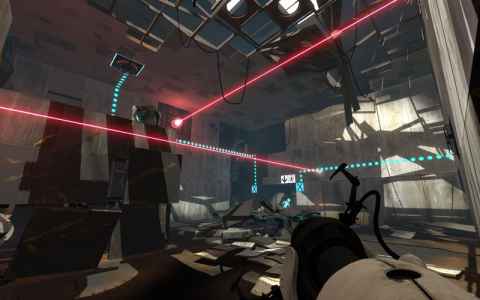
The first third of the game. This is one of the few chambers where most surfaces are portal-able. It is also one of the instances where you get to see GLaDOS configure a chamber. The big cube to the left is just finishing assembly, and straight ahead you can see a set of plates being pushed up through the rubble.
This is most glaring in the middle third of the game, when you regularly end up in a vast chamber filled with massive amounts of detailed objects - and yet only about two square meters are portal-able surfaces. Then you go to the next vast chamber and look for the little white spot that is the only place where you can stick a portal. Rinse and repeat.
